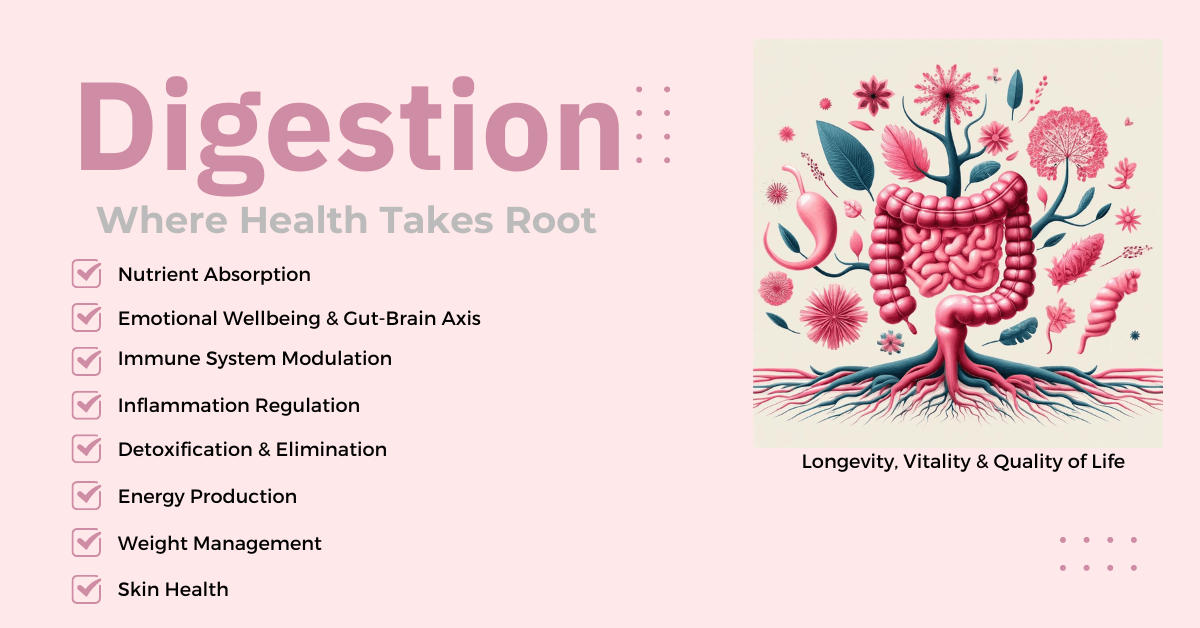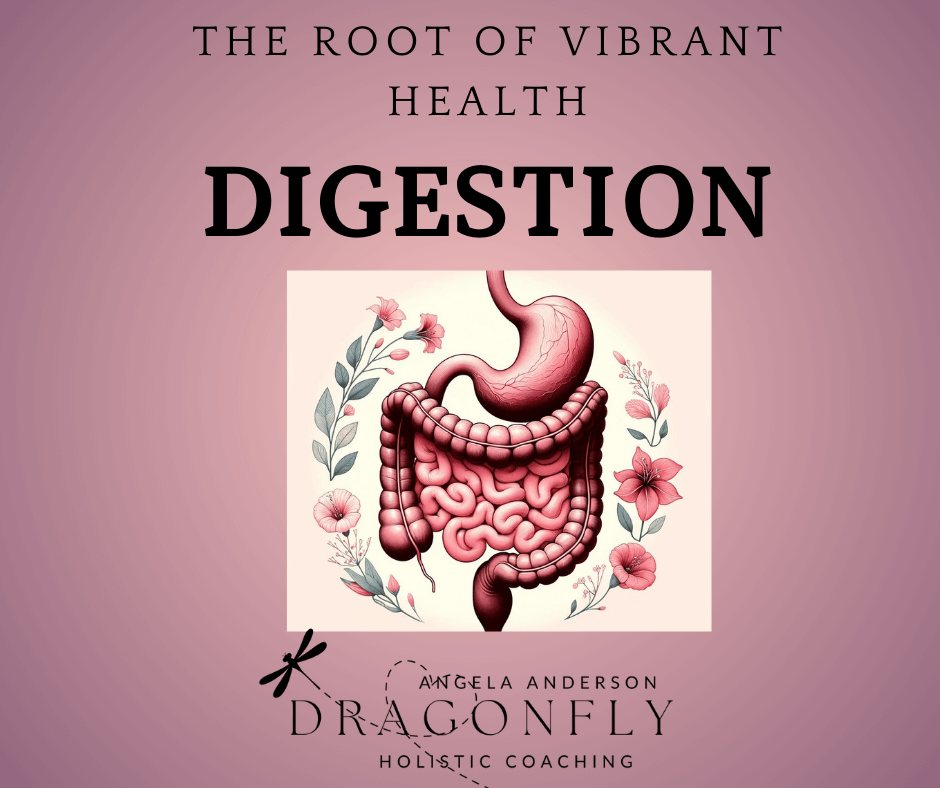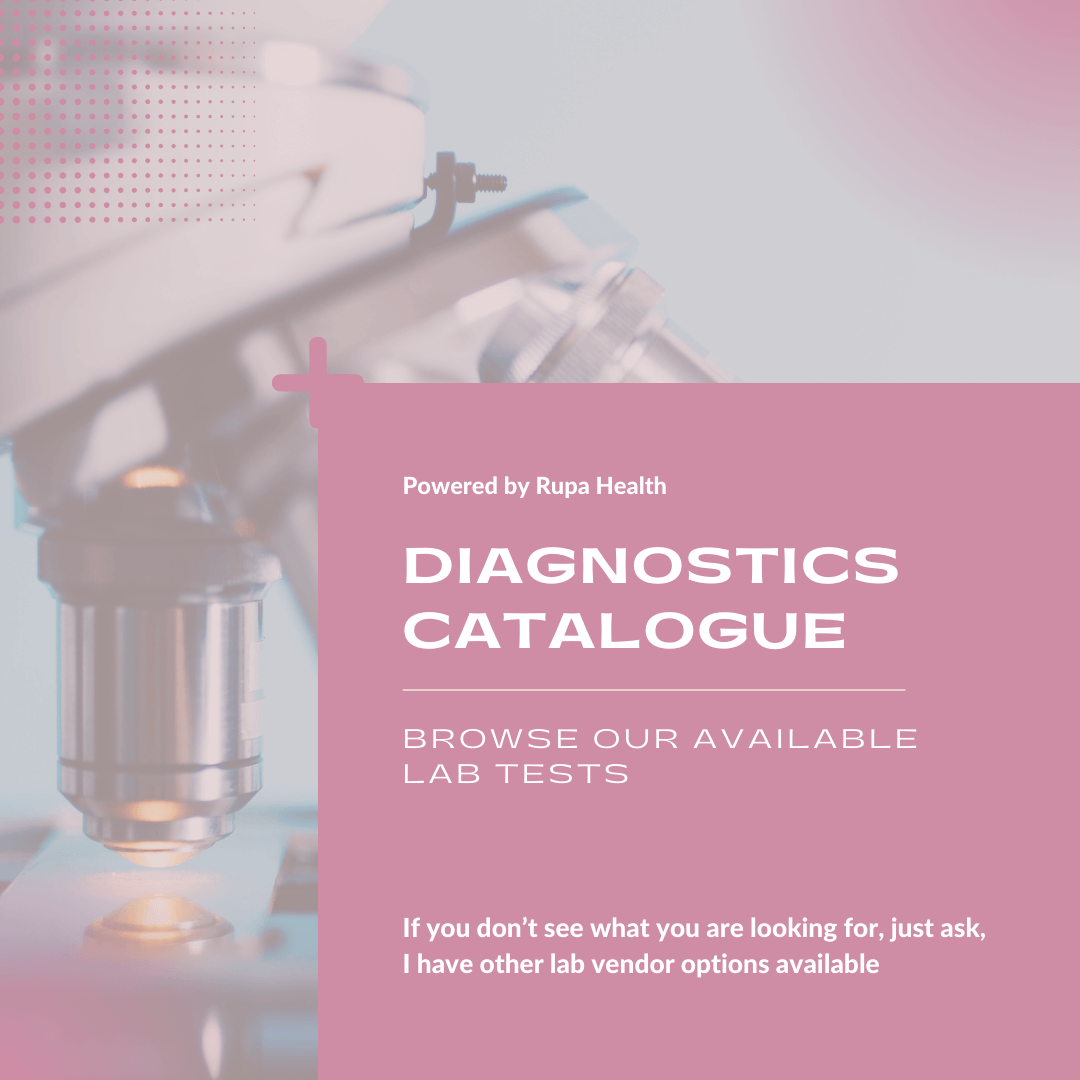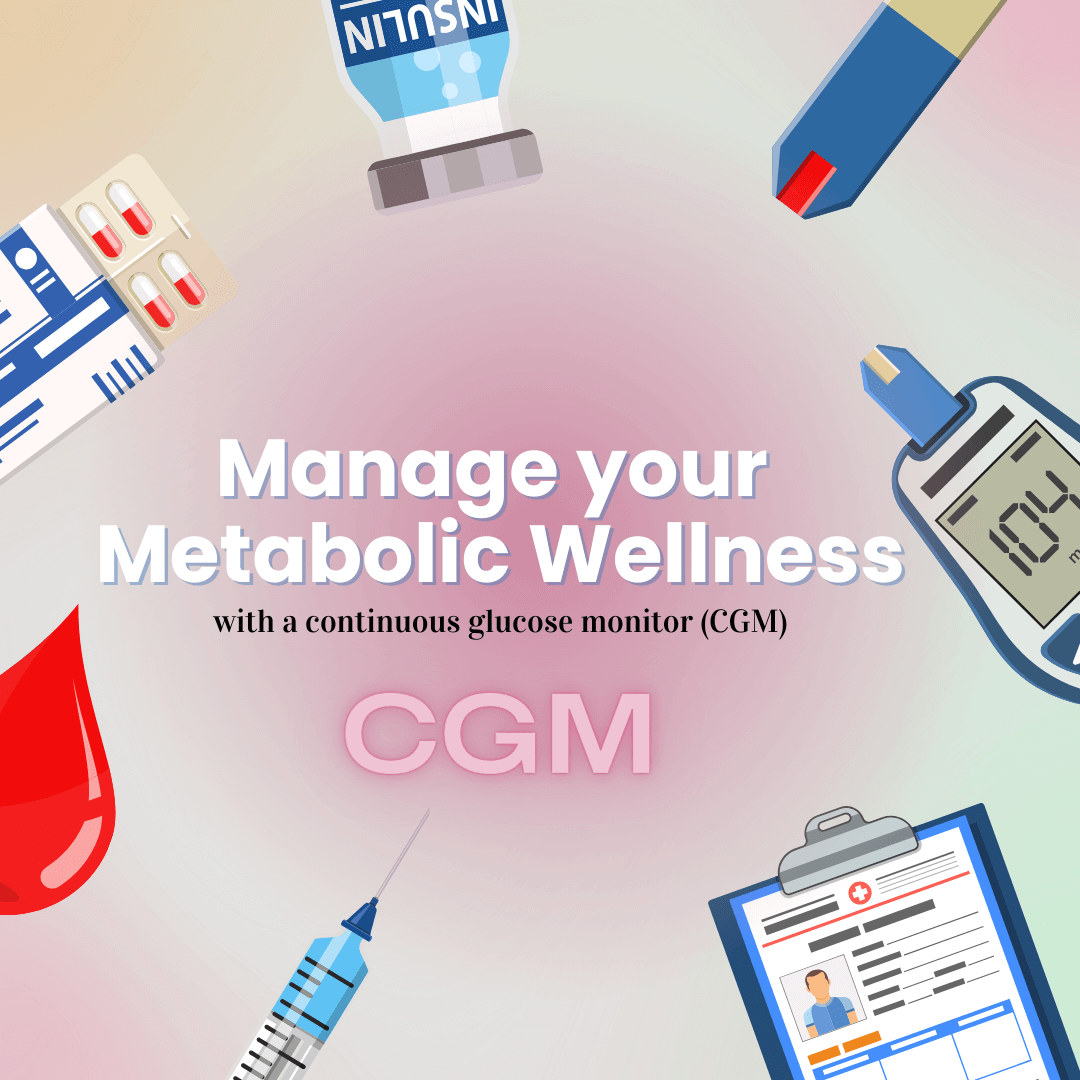Foundations of Digestive Wellness
Where Health Takes Root
The Root of Health
Welcome into the fascinating realm of digestive health—explore the intricate workings of the body's "second brain" and uncover the profound impact of digestion on overall well-being. Here, we'll delve deep into the roots of vitality, discovering how the health of our gut influences every aspect of our health and vitality.
Throughout the ages, wisdom from ancient medical systems like Ayurveda and Traditional Chinese Medicine has emphasized the pivotal role of digestion in maintaining health. These traditions recognize that the gut is where health truly takes root, prescribing tailored diets and herbal remedies to optimize digestion and elimination.
Despite the ancient wisdom, conventional medicine often overlooks the significance of digestive health, focusing more on symptomatic relief than addressing underlying imbalances. However, the emerging field of functional nutrition offers a revolutionary approach, delving into the root causes of health issues and emphasizing the importance of digestive health in promoting overall wellness.
It's worth noting that traditional medical education often provides only a cursory understanding of nutrition, despite its profound impact on health. Yet, a basic understanding of biochemistry reveals the crucial role that nutrients play in maintaining optimal bodily function. Furthermore, many modern pharmaceuticals have their roots in herbal preparations, highlighting the deep connection between traditional wisdom and modern medicine.
Healthy digestion isn't just about avoiding digestive discomfort; it's the key to unlocking vibrant health and vitality. Even if we don't experience overt digestive symptoms, the path to resolving many health issues begins with what we put into our mouths and how our bodies process those nutrients. Digestion truly is the cornerstone of wellness, influencing everything from immune function to mental health, implicated in every single system of the body.

Digestive Health
The Gateway to Vitality and overall Wellbeing
From the moment food enters our mouths, a complex series of processes begins, ensuring that nutrients are broken down, absorbed, and utilized effectively. Understanding the intricacies of digestion not only highlights its importance but also reveals its profound interconnectedness with every system in the body.
The Digestive Process
Digestion starts with the act of eating, where food is broken down mechanically by chewing and chemically by enzymes in saliva. As food travels down the esophagus into the stomach, it encounters gastric juices that further break it down into a semi-liquid form known as chyme. This chyme then moves into the small intestine, where the majority of nutrient absorption occurs with the help of bile from the liver and digestive enzymes from the pancreas.
Nutrient Absorption and Utilization
The small intestine, with its vast surface area lined with villi and microvilli, is the primary site for nutrient absorption. Here, essential nutrients such as amino acids, fatty acids, vitamins, and minerals are absorbed into the bloodstream and transported to various cells and tissues. The remaining undigested material moves into the large intestine, where water is absorbed, and the gut microbiota play a crucial role in fermenting dietary fibers, producing essential short-chain fatty acids, and synthesizing certain vitamins.
Everything is Connected
Everything is Rooted in Digestive Health
Even if you have no digestive complaints or complications, the path back to wellness inevitably begins with digestion. Each day, scientists are learning more and more about Digestion and its connection to nearly every system in the body.
Immunity: Approximately 70% of the body's immune cells reside in the gut-associated lymphoid tissue (GALT). Here, the immune system learns to distinguish between harmful pathogens and beneficial microbes. A healthy gut microbiome supports immune function, reduces inflammation, and protects against infections. Conversely, imbalances in the gut microbiota, known as dysbiosis, can lead to chronic inflammation and contribute to various autoimmune and metabolic disorders.
Hormone Balance: The gut microbiota influences the production and regulation of hormones, including those involved in stress responses, metabolism, and reproductive health. Proper digestion ensures balanced hormone levels, which are crucial for overall health.
Blood Sugar Regulation and Metabolism: The digestive system plays a vital role in regulating blood sugar levels and metabolic health. By breaking down carbohydrates into glucose, the body ensures a steady supply of energy. The gut microbiota also impact lipid metabolism and energy balance, influencing weight management and metabolic homeostasis.
Brain and Nervous System: The gut-brain axis, a bidirectional communication system involving neural, hormonal, and immunological pathways, highlights the connection between digestion and mental health. The gut produces neurotransmitters such as serotonin, impacting mood, emotions, and cognitive functions. The vagus nerve facilitates constant communication between the gut and the brain, influencing stress responses, appetite, and even cognitive functions.
Muscles, Joints, and Bones: Nutrients absorbed through digestion, such as calcium, magnesium, and protein, are essential for muscle function, joint health, and bone density. Proper digestion ensures that these nutrients are available to support the musculoskeletal system.
Energy Production: Efficient digestion and nutrient absorption are critical for energy production. Carbohydrates, fats, and proteins are broken down into glucose, fatty acids, and amino acids, respectively, which are then utilized by cells to produce energy.
Cardiovascular Health: Digestive health is linked to cardiovascular health through the regulation of cholesterol levels and blood pressure. The gut microbiota play a role in metabolizing lipids and producing compounds that support heart health.
Urinary Health: The kidneys rely on a balanced supply of electrolytes and nutrients, regulated by digestion, to maintain urinary health and function.
Dental Health: Proper digestion begins in the mouth, where chewing and saliva play a critical role in breaking down food and maintaining oral health. Good digestion supports healthy teeth and gums.
Eye Health: Nutrients absorbed through digestion, such as vitamins A, C, and E, are essential for maintaining healthy vision and preventing eye conditions.
Reproductive Health: A balanced diet and efficient digestion support reproductive health by providing essential nutrients that regulate hormonal cycles and reproductive functions.
Skin Health: The skin reflects overall health, and proper digestion ensures the absorption of vitamins and minerals that support skin integrity and appearance. A healthy gut microbiome also helps reduce skin inflammation and conditions such as acne and eczema.
Detoxification: The liver, a key player in digestion, is also central to detoxification processes. Efficient digestion aids the liver in filtering toxins from the blood and excreting them via the digestive tract.
Scroll down to keep reading or click one of the following links to go directly to the area of interest
TOP | HEALTHY GUT | LEAN | UNHEALTHY GUT
The Signs of a Healthy Gut
Indicators of Optimal Digestive and Overall Health
The health of your gut is intrinsically linked to numerous aspects of your overall well-being, including your immune system, weight management, mental health, and even your response to stress. Recognizing the signs of a healthy gut can help you understand the importance of maintaining a balanced gut microbiome and how it affects your daily life. Here are some key indicators that your gut health is on the right track:
1. Regular Bowel Movements
One of the most apparent signs of a healthy gut is the regularity and quality of bowel movements. A healthy digestive system will typically result in bowel movements that are consistent, easy to pass, and occur one to three times per day. The stool should be well-formed, not too hard or loose, and free from undigested food particles. Regular, normal bowel movements indicate that your digestive system is effectively processing the food you eat and efficiently eliminating waste.
2. Consistent Energy Levels
Another sign of a healthy gut is having steady energy levels throughout the day. If your gut is healthy, it's effectively breaking down food and absorbing nutrients, which helps maintain good energy levels. Fluctuations in energy—feeling spikes after meals followed by crashes—may indicate blood sugar imbalances or poor nutrient absorption, often tied to gut health.
3. Mental Clarity
The gut-brain axis is a well-documented link between the digestive system and brain function. A healthy gut contributes to better cognitive functions such as concentration, memory, and decision-making. If you find that you have a clear mind and can focus easily without frequent feelings of mental fog, it's a good sign that your gut health is in good shape.
4. Ability to Maintain a Healthy Weight
A balanced gut microbiome helps to regulate your metabolism and can assist in maintaining a healthy weight. An optimal balance of gut bacteria aids in digesting food and absorbing nutrients, which can help control hunger and reduce cravings for unhealthy foods. Conversely, an imbalanced gut flora is linked to weight gain and difficulty losing weight.
5. Healthy Reactions to Stress and Food
How your body responds to stress and food can also be a telltale sign of gut health:
- Stress Response: A healthy gut can better manage the physiological impacts of stress. When your gut is healthy, your body is better equipped to cope with stress, leading to a more balanced mood and less anxiety.
- Food Tolerance: If you can eat a variety of foods without discomfort, it's a strong indicator that your gut is healthy. Frequent gas, bloating, or indigestion after eating may suggest food intolerances or an imbalance in gut bacteria.
Understanding the signs of a healthy gut is crucial in recognizing the broad impacts of gut health on your overall well-being. Regular bowel movements, consistent energy, mental clarity, an ability to maintain a healthy weight, and healthy reactions to stress and food are all indicators that your digestive system is functioning well. By nurturing your gut health through a balanced diet rich in fiber, probiotics, and regular physical activity, you can support these positive health outcomes and improve your quality of life.

TOP | HEALTHY GUT | LEAN | UNHEALTHY GUT
LEAN
Key Pillars of Wellness
LEAN: The Pillars of Wellness
Welcome to the LEAN section, where we explore the four fundamental pillars of wellness: Lifestyle, Exercise, Attitude, and Nutrition. Each of these elements plays a vital role in supporting and enhancing digestive health, which in turn, promotes overall vitality and wellbeing.
Lifestyle
Adopting a balanced lifestyle is crucial for optimal digestive health. Daily habits such as mindful eating, staying hydrated, getting quality sleep, and managing stress can significantly impact the function of your digestive system. By incorporating these healthy lifestyle practices, you can support efficient digestion, enhance nutrient absorption, and promote overall wellbeing.
Exercise
Regular physical activity is essential for maintaining a healthy digestive system. Different types of exercise—strength training, cardiovascular activities, flexibility exercises, and balance training—each play a unique role in supporting and enhancing digestion. By incorporating a balanced exercise regimen, you can improve gut motility, reduce inflammation, manage stress, and promote overall digestive health.
Attitude
Your mental and emotional well-being plays a significant role in digestive health. Maintaining a positive attitude and effectively managing stress can improve digestion and reduce issues like irritable bowel syndrome. Practices such as mindfulness, meditation, and positive thinking support a healthy gut-brain connection, enhancing overall digestive function and promoting holistic wellness.
Nutrition
Nutrition is a cornerstone of digestive health. A balanced diet rich in fiber, probiotics, and essential nutrients supports efficient digestion and a healthy gut microbiome. By making mindful food choices and staying hydrated, you can enhance nutrient absorption, reduce digestive discomfort, and promote overall wellbeing. Proper nutrition is key to maintaining a healthy digestive system and overall vitality
TOP | HEALTHY GUT | LEAN | UNHEALTHY GUT

Lifestyle
How we Live
Adopting a balanced lifestyle is crucial for optimal digestive health. Daily habits such as mindful eating, staying hydrated, getting quality sleep, and managing stress can significantly impact the function of your digestive system. By incorporating these healthy lifestyle practices, you can support efficient digestion, enhance nutrient absorption, and promote overall wellbeing.
Exercise
How we move
Exercise is a powerful tool for enhancing digestive health. It not only helps improve gut motility but also reduces stress, balances hormones, and strengthens the body's resilience. Regular physical activity is essential for maintaining a healthy digestive system. Different types of exercise—strength training, cardiovascular activities, flexibility exercises, and balance training—each play a unique role in supporting and enhancing digestion. By incorporating a balanced exercise regimen, you can improve gut motility, reduce inflammation, manage stress, and promote overall digestive health.


Attitude
How we think
Your mental and emotional well-being plays a significant role in digestive health. Maintaining a positive attitude and effectively managing stress can improve digestion and reduce issues like irritable bowel syndrome. Practices such as mindfulness, meditation, and positive thinking support a healthy gut-brain connection, enhancing overall digestive function and promoting holistic wellness.
Nutrition
How we eat
Nutrition is a cornerstone of digestive health. A balanced diet rich in fiber, probiotics, and essential nutrients supports efficient digestion and a healthy gut microbiome. By making mindful food choices and staying hydrated, you can enhance nutrient absorption, reduce digestive discomfort, and promote overall wellbeing. Proper nutrition is key to maintaining a healthy digestive system and overall vitality.

TOP | HEALTHY GUT | LEAN | UNHEALTHY GUT
Digestive Complications
Why they're so Common
In recent decades, there has been a significant increase in gut-related health issues, affecting individuals of all ages. From mild bloating to severe irritable bowel syndrome, the prevalence of digestive disorders is alarmingly high. Several factors contribute to this trend:
1. Dietary Changes: Modern diets differ drastically from those of our ancestors just a century ago. The widespread consumption of processed foods, fast food, and convenience items has become the norm. These foods are often low in fiber, high in unhealthy fats and added sugars, and laden with artificial additives, preservatives, and pesticides. Such dietary habits disrupt the delicate balance of our digestive ecosystem.
2. Lifestyle & Stress Factors: Our fast-paced lifestyle exacerbates stress levels, which in turn impacts our digestive system. Chronic stress can lead to increased inflammation, altering the gut's microbial diversity and balance. This disruption can create a vicious cycle of stress and inflammation, further impairing gut health.
3. Antibiotics: While antibiotics have been life-saving, their overuse has significant drawbacks. Antibiotics indiscriminately kill both pathogenic and beneficial bacteria, disrupting the natural balance of the gut microbiome. This disruption can create an environment conducive to the growth of opportunistic pathogens.
4. Environmental Factors: Exposure to environmental toxins such as pesticides, heavy metals, and pollutants plays a substantial role in digestive health. These toxins can compromise gut barrier function, increase intestinal permeability (commonly known as leaky gut), and trigger chronic inflammation. This inflammation is not only linked to gastrointestinal issues but also to systemic diseases like heart disease and diabetes.
5. Sedentary Lifestyle: A lack of physical activity can negatively affect gut motility, which is essential for regular bowel movements and the elimination of toxins. A sedentary lifestyle can lead to constipation, allowing toxins to be reabsorbed into the bloodstream instead of being expelled from the body.
Addressing these factors through lifestyle changes, dietary adjustments, and mindful management of environmental exposures can significantly improve gut health and reduce the prevalence of digestive disorders.

Common Digestive Complications
Candidiasis
Hemorrhoids
Dysbiosis
Leaky Gut
TOP | HEALTHY GUT | LEAN | UNHEALTHY GUT
6R Framework
Digestive Wellness
The Six R Framework is a holistic approach to digestive health that addresses underlying issues and promotes long-term wellness by focusing on six crucial steps: Remove, Replace, Re-inoculate, Repair, Rebalance, and Regulate. This systematic method is widely used in functional medicine and nutrition to help individuals restore and maintain optimal gut health, which is essential for overall well-being. Here’s a comprehensive introduction to each of the six steps:
1. Remove
The first step involves identifying and eliminating substances that negatively impact the gastrointestinal system. This includes common dietary irritants such as gluten, dairy, and processed sugars, as well as environmental toxins like pollutants and harmful chemicals found in household products. The goal is to reduce inflammation, minimize stress on the digestive system, and create a clean slate for healing.
2. Replace
Once harmful elements are removed, the next step is to replace essential ingredients that the body needs for proper digestion and absorption. This may include digestive enzymes, hydrochloric acid, and bile acids, which are crucial for breaking down food and absorbing nutrients effectively. This step ensures that the digestive system has all the necessary tools to function optimally.
3. Re-inoculate
Healthy gut flora is essential for immune function, nutrient absorption, and overall health. Re-inoculating the gut involves introducing beneficial bacteria through high-quality probiotics and providing prebiotic foods that help nourish these microbes. This step aims to restore a healthy balance to the gut microbiome, which can be disrupted by antibiotics, poor diet, and stress.
4. Repair
Chronic gut issues can damage the intestinal lining, leading to conditions like leaky gut syndrome where toxins and undigested food particles escape into the bloodstream. The repair phase focuses on healing the gut lining with nutrients that support mucosal health, such as collagen, zinc, antioxidants, and essential fatty acids. This step is crucial for preventing inflammation and autoimmunity, which can stem from an unhealthy gut.
5. Rebalance
Achieving and maintaining gut health requires more than just dietary changes; it also involves balancing lifestyle factors that affect overall health. This includes adequate sleep, regular physical activity, stress management, and healthy relationships. Rebalancing these aspects of life helps enhance the body’s natural healing capacity and supports the efficacy of the other steps in the framework.
6. Regulate
The final step of the framework involves regular monitoring and adjusting as needed to maintain gut health over the long term. This includes ongoing assessment of dietary habits, lifestyle choices, and possibly the continued use of supplements. It also involves staying responsive to changes in the body’s needs due to aging, stress, or environmental factors, ensuring sustained digestive health and overall wellness.
The Six R Framework is a comprehensive approach that addresses the complexities of gut health from multiple angles, emphasizing the interconnection between diet, lifestyle, and the body’s internal environment. By following these steps, individuals can achieve significant improvements in their digestive health, which in turn can lead to better health and quality of life.
TOP | HEALTHY GUT | LEAN | UNHEALTHY GUT
Functional Testing
Metabolic Wellness Profile
SIBO (Small-intestinal bacterial overgrowth) Testing
Lactulose Breath Testing
GI Spotlight

TOP | HEALTHY GUT | LEAN | UNHEALTHY GUT
This page contains affiliate links. This means I may earn a commission should you choose to sign up for a program or make a purchase using my link.
Functional Diagnostic Nutrition® health coaches do not diagnose, treat, prevent, or cure any
disease or condition. Nothing we share with our clients is intended to substitute for the advice,
treatment or diagnosis of a qualified licensed physician. Functional Diagnostic Nutrition® (FDN)
Practitioners may not make any medical diagnoses or claim, nor substitute for your personal
physician’s care. It is the role of a Functional Diagnostic Nutrition® Practitioner to partner with
their clients to provide ongoing support and accountability in an opt-in model of self-care and
should be done under the supervision of a licensed physician.









